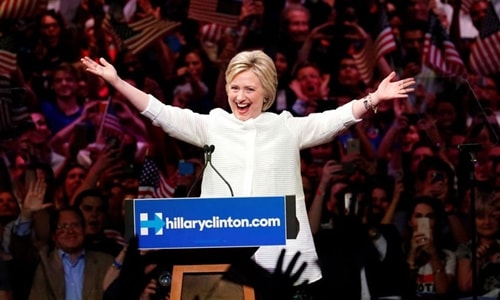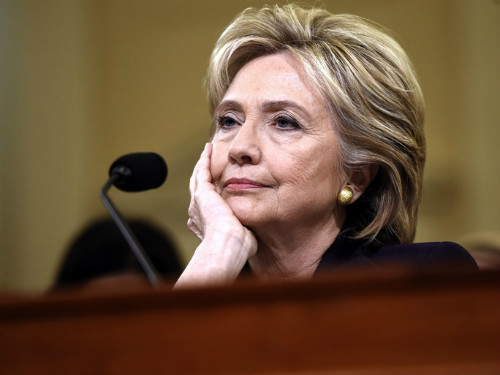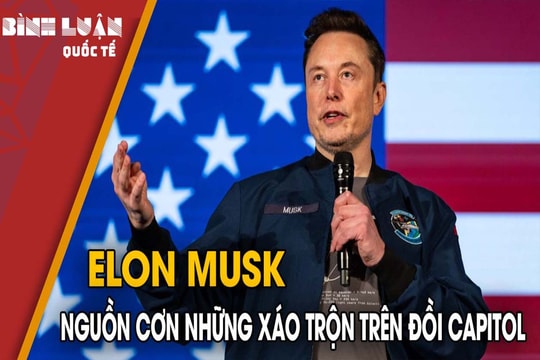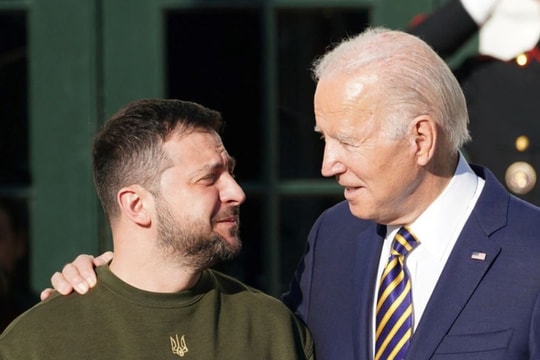Hillary Clinton and the arduous journey into American political history
Taking on many roles in American politics, Mrs. Clinton encountered many difficulties but also surprised people time and time again.
With a resounding victory on June 7, Mrs. Hillary Clinton firmly secured the Democratic Party's ticket to the White House, becoming the first female candidate of a major political party in the US to run for president.
 |
US presidential candidate Hillary Clinton. Photo: AP |
In the primaries in 6 states on the final day of Super Tuesday on June 7, Mrs. Hillary Clinton declared that she had won enough delegates to be the Democratic candidate to run for the White House. Her rival in the same party, Mr. Bernie Sanders, also declared that he would support her to stop her Republican opponent.
Speaking to a crowd of supporters in Seneca Falls, New York, Mrs. Clinton affirmed: "Tonight concludes a great journey - a very long journey. We owe so much to those who came last night, and tonight belongs to all of you."
This victory helped Mrs. Clinton become the first female candidate in American history to win the nomination of a major party to run for the White House.
If there was a single moment that suggested Clinton would win, it was not the moment she announced her candidacy on a sunny day in New York last June, nor any of her speeches celebrating her victory over Senator Sanders.
According to Amy Chozick of the New York Times, that moment must have been when Mrs. Clinton gently brushed the dust off her shoulders while testifying before a Republican-majority House committee last October. She was grilled for more than eight hours about her handling of the 2012 terrorist attack on the U.S. consulate in Benghazi, Libya.
 |
Mrs. Clinton appeared calm during a hearing before a US Congressional committee about the attack on the US consulate in Benghazi, Libya in 2012. Photo: AFP |
She may not be a gifted speaker like President Obama, or a traditional politician who goes out to groups of voters, shakes hands and chats like her husband, former President Bill Clinton, but she has a steely spirit in a campaign that has inspired older women, voters of color and many others who see her steadfastness as a mirror for their own struggles.
As a politician’s wife, former first lady, senator, secretary of state and two-time candidate for the White House, Mrs. Clinton, 68, has redefined the role of women in American politics. She has surprised America time and time again, in scandals, failures and successes.
“She comes onstage in front of a crowd like a different person,” said Ann Lewis, a longtime adviser to the former secretary of state. “She brings charisma, dedication and attacks — the attacks from both parties have not stopped.”
Clinton's close associates say it is a coincidence that now, after overcoming so many obstacles, she will face an opponent eager to attack her.
Thorns
For 14 years in a row, and 20 years in total, Clinton has been voted the most admired woman in America, according to Gallup’s annual poll. But her campaign, along with the controversy surrounding her use of a private email account while secretary of state, has taken a toll on her. Her popularity and trust among Americans have plummeted. She is being portrayed as a calculating and hypocritical politician, like the sinister Lady Macbeth in Shakespeare’s famous play.
And in the same way, her reputation and political longevity are no longer indestructible assets. The huge fees she earns from speaking to Wall Street banks also help hold her back in the election, giving her opponents a reason to attack her.
Clinton’s career has been full of surprises. She came of age in the feminist movement of the 1960s at Wellesley College, where she urged her classmates to stop demanding big changes and instead work on “making the impossible possible.” She later traveled the southern states to advance her husband’s ambitions.
She served as one of Bill Clinton's chief strategists on his presidential campaign, and oversaw an unsuccessful health care reform effort, while keeping her marriage together through her husband's sex scandals and the controversies surrounding them.
But for all her contradictions, she is also emblematic of a society in which expectations of women, and women’s expectations of themselves, are changing rapidly. Analyzing views of Clinton and powerful women in general is not always easy.
Roy M. Neel, who managed Al Gore’s 1992 vice presidential campaign, said that women in the South were particularly unpopular with Clinton, the first working mother to become America’s first lady—and the only first lady to have an office in the West Wing. They disliked Clinton because her success made them feel bad about themselves.
If the conservative antipathy toward Clinton can be explained in part by Americans’ difficulty in changing their conceptions of gender roles in family, work and politics, her political struggles have also left scars that define her as a person: she knows the realities of Washington but is cautious and wary of making mistakes.
Clinton's drawn-out race with Sanders, who was widely seen as unlikely to make it past the first few primaries, has shown the price Clinton has paid for that reticence.
At a time when many voters are drawn to Mr. Trump’s impulsive, unbridled style and Mr. Sanders’s idealism, Mrs. Clinton has embraced neither trend.
Anna Greenberg, a Democratic pollster, said that playing it safe in an election would not help Clinton. "The primaries in both parties showed how angry and frustrated voters are," Greenberg said. "She will have to and needs to adjust accordingly."
For 14 months, Clinton's campaign has been off-beat in attracting young voters, and in places where voters demand more than Clinton has promised.The former secretary of state's struggles with this segment of voters could be a worrying sign.
While her husband focused on appealing to the “forgotten middle class” in his 1992 campaign, Clinton has failed to articulate such a clear and simple focus for her campaign. And while she has offered more detailed policy proposals and positions than any other candidate, what she truly believes in is unclear to many voters.
Clinton has praised President Obama’s record over the past eight years, and won nearly 77 percent of the vote among black voters as of May 10. But she has pledged to do more to give citizenship to illegal immigrants than Obama, criticized Obama’s signature Trans-Pacific Partnership trade deal, and rejected Obama’s proposed plan to defeat the Islamic State group by establishing a no-fly zone in Syria.
She praised her husband's record on economic policy as president, and suggested that Clinton would be in charge of revitalizing areas hardest hit by the economic crisis. But the former secretary of state also reversed some key parts of her husband's legacy.
In an election season in which Mr. Sanders has focused on attacking Wall Street and Mr. Trump has waged a war on immigrants, and both have pledged to reverse job losses and economic hardship, Mrs. Clinton has stuck to hard-nosed pragmatism.
The most "generous" promise she made was that she would not overpromise. "We don't need that," Mrs. Clinton declared to voters.
But what she made up for by refraining from bombastic rhetoric, she listened to people’s problems and offered solutions. The former secretary of state was moved to tears as she listened to a man whose mother had Alzheimer’s disease, and a woman who lost her child in a gun-related accident.
Mrs Clinton has admitted a weakness she never revealed in the 2008 election, when she campaigned as a tough commander-in-chief, seeking to dispel any doubts about whether she was strong enough to hold the Oval Office.
"I'm not a natural politician, like my husband or President Obama," Clinton said in a debate with Sanders.
To her supporters, she may be following some strange kind of logic. Mrs. Clinton is expected to project the courage of a commander in chief, the charm of a drinking buddy, and the warmth of a dear aunt.
Many would argue that this is an impossible combination—and if she could achieve all of these things, there would surely be some other essential quality that she lacks. Because there has never been a model for a female American president.
“People are very uncertain about what kind of female leader they want,” said New York Sen. Kirsten Gillibrand. “The uncertainty about Hillary comes from the outside. It comes from within.”
Of course, public attitudes toward female leadership will change. In a press conference earlier this week, hours before it was announced that Clinton had secured the nomination, the former secretary of state looked beyond the November general election. She believed that a future female presidential candidate would not require as much grit and courage to run for the White House.
"The vast majority of women and girls and fathers who bring their daughters to me say they support me because of their daughters," Clinton said. "And I really think it makes a huge difference if a father or mother can look at their daughter the way they look at their son and say, 'You can be anything you want to be in this country, including president of the United States.'"
According to VNE
| RELATED NEWS |
|---|







